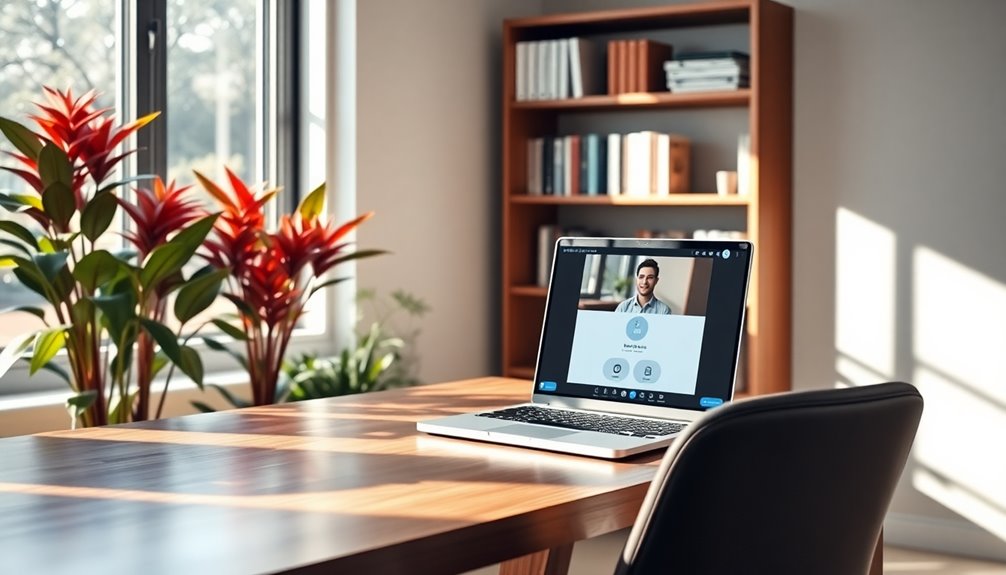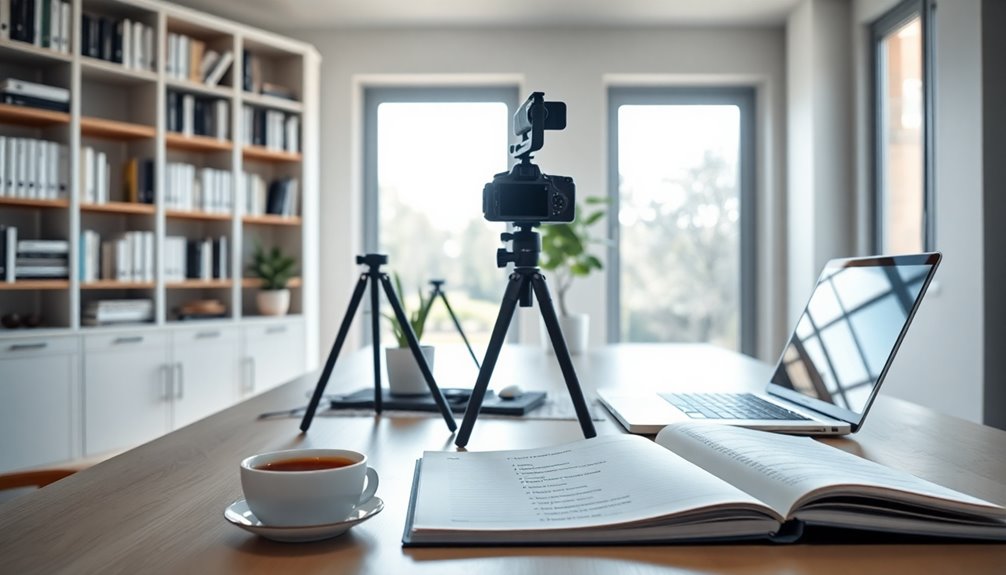Mastering online video interviews means you need to focus on several key areas. Start with technical preparation; test your internet, camera, and microphone beforehand. Set the scene by choosing a quiet, well-lit space with a tidy background. Dress professionally, even if only your upper body is visible. During the interview, maintain good body language—sit up straight, make eye contact with the camera, and smile warmly. Show genuine interest in the conversation to engage your interviewer. These foundational tips can greatly enhance your presence. Stick around to discover even more strategies that can make you shine in your next interview!
Key Takeaways
- Test your internet connection, camera, and microphone before the interview to ensure everything is functioning properly.
- Choose a quiet, well-lit space with a neutral background to minimize distractions during the interview.
- Dress professionally and appropriately for the company's culture, even if only the upper body is visible.
- Maintain positive body language, make eye contact with the camera, and display a warm smile to foster connection.
- Familiarize yourself with the video platform and conduct a test call to troubleshoot any technical issues in advance.
Understanding Video Interviews

Video interviews have really taken off in the hiring process, offering flexibility that benefits both you and the interviewer. As remote work becomes more common, many employers now rely on platforms like Zoom, Skype, and Microsoft Teams to conduct interviews.
In fact, around 60% of employers report using video interviews, making it essential for you to adapt to this format. Understanding how to navigate these platforms and the interview dynamics can give you a significant edge.
You'll want to guarantee you're comfortable with the technology and aware of the unique aspects of virtual interviews. Embrace this opportunity to showcase your skills in a modern, efficient way, and you'll be well on your way to making a lasting impression.
Technical Preparation

To make a great impression during your video interview, technical preparation is key. Start by testing your internet connectivity to avoid interruptions.
Verify your camera and microphone are functioning correctly. Familiarize yourself with the chosen video platform and update all necessary software beforehand.
Conduct a test call to check both your microphone and speakers; having a backup device ready is smart. Address any tech issues before the interview to guarantee a smooth experience.
This preparation helps you stay focused on the conversation rather than worrying about technical glitches. Remember, a little effort in preparing your technology can make a significant difference in how you come across to your interviewer.
Don't leave anything to chance; be ready!
Setting the Scene

Creating the right environment for your video interview is essential for making a positive impression.
Choose a quiet, well-lit space where you won't be interrupted. Natural light is best, so position yourself facing a window if possible.
Keep your background neutral and tidy; avoid clutter that can distract the interviewer. Make certain pets and other household members are aware of your interview time to minimize disruptions.
If needed, consider using a virtual background to maintain professionalism. Ascertain your camera is at eye level, allowing for a more engaging conversation.
Test your setup in advance to guarantee everything looks and sounds good, setting the stage for a successful interview. A little preparation goes a long way in creating a favorable atmosphere.
Dress Code

How should you dress for a video interview? Dress professionally, just like you'd for an in-person meeting.
Choose attire that reflects the company's culture; if you're unsure, opt for business casual. Avoid overly bright colors or distracting patterns that can take attention away from you.
Make sure your clothing is comfortable, as discomfort can distract you during the interview. Pay attention to grooming and hygiene—neat hair and minimal accessories create a polished look.
It's crucial to feel confident in what you wear, as this can impact your performance. Additionally, showcasing strong communication skills through your appearance can enhance your overall impression during the interview.
Finally, remember that the interviewer will see only your upper body, so wear appropriate clothing from the waist up to maintain professionalism throughout the interview.
Body Language and Focus

Consistently maintaining positive body language during a video interview can greatly impact your impression on the interviewer.
Sit up straight and keep your shoulders back to convey confidence. Make eye contact by looking at the camera instead of the screen, as this creates a connection.
Use hand gestures moderately to emphasize key points, but avoid fidgeting, which can distract from your message. A warm smile goes a long way in establishing a positive atmosphere.
Stay focused on the interviewer, showing genuine interest in the conversation. Additionally, being aware of your non-verbal cues can significantly enhance your communication effectiveness during the interview.
Research the Company

Positive body language is just one part of presenting yourself effectively in a video interview; understanding the company can greatly enhance your performance as well.
When you know the organization, you can tailor your answers and demonstrate genuine interest. Here are key areas to focus on:
- Company mission and values.
- Recent news, achievements, or challenges.
- Role requirements and expectations.
- Company culture and work environment.
- Questions to ask the interviewer.
Handling Technical Issues

When technical issues arise during a video interview, staying calm and composed is essential. Have a backup plan ready, like a mobile hotspot or an alternative device, to quickly resolve connectivity problems.
If disruptions occur, inform the interviewer promptly and apologize for the inconvenience. Reconnect as quickly as you can, and if issues persist, suggest continuing the conversation via a phone call.
Don't let frustration show; your ability to handle setbacks reflects your professionalism. Familiarize yourself with the platform before the interview and ascertain all equipment works properly.
Regularly checking your internet speed can also help prevent issues. Remember, how you manage technical difficulties can leave a lasting impression on your potential employer.
Follow-Up Etiquette

A thoughtful follow-up after your video interview can leave a strong impression on your potential employer.
It's your chance to reinforce your interest and professionalism. Here are key points to reflect on:
- Send a thank-you email within 24 hours.
- Reiterate your enthusiasm for the position.
- Mention specific topics discussed during the interview.
- Keep your communication professional and concise.
- Avoid excessive follow-ups; one is sufficient.
Frequently Asked Questions
How Do I Handle Unexpected Interruptions During the Interview?
When unexpected interruptions happen during your interview, stay calm and composed.
If something distracts you, politely acknowledge it and briefly pause if necessary. Inform the interviewer of the situation, then reconnect quickly.
Keep a backup plan ready, like a phone, in case the interruption affects your connection.
What Should I Do if I Feel Too Nervous?
If you feel too nervous, take a deep breath and remind yourself that it's natural to feel this way.
Visualize a successful interview and focus on your strengths.
Practice relaxation techniques, like stretching or deep breathing, before the interview.
Remember, you've prepared well, and confidence will grow as you start speaking.
Keep your focus on the interviewer, and don't hesitate to pause and gather your thoughts if needed.
You've got this!
Can I Use Notes During the Video Interview?
Imagine sitting in a well-lit room, your notes neatly organized beside you. Yes, you can use notes during the video interview, but keep it subtle.
Glance at them for key points or questions, ensuring you maintain eye contact with the camera. It's all about balance—using notes to jog your memory while staying engaged with the interviewer.
This approach can help you feel more confident and prepared, enhancing your overall performance.
How Do I Address a Poor Internet Connection?
If you're facing a poor internet connection during your video interview, stay calm.
Inform the interviewer about the issue politely and ask if it's okay to reconnect. Use a backup device or hotspot if available.
If disruptions happen, don't hesitate to suggest continuing via a phone call. Keeping a positive attitude will help maintain professionalism and show your adaptability in challenging situations.
Always have a contingency plan ready before the interview.
What if the Interviewer Seems Distracted or Uninterested?
Did you know that 60% of employers now use video interviews?
If your interviewer seems distracted or uninterested, don't panic. Stay focused on your responses and maintain your energy.
Consider engaging them by asking a thoughtful question related to the discussion. This might spark their interest and refocus their attention.
Conclusion
In the world of online video interviews, preparation is key to making a strong impression. By mastering the technical setup, creating an inviting environment, and dressing to impress, you're setting yourself up for success. Remember, it's not just about what you say but how you say it. With these tips in your back pocket, you'll be ready to seize the day and turn that opportunity into a winning moment. Good luck—you've got this!
Eugene brings a fresh, dynamic voice to our platform as one of our talented Writers. Specializing in research-driven content, he explores the latest findings in psychology and personal growth, translating them into actionable insights for our readers. Eugene’s work is fueled by a curiosity about what makes us tick and a desire to help others unlock their potential.










